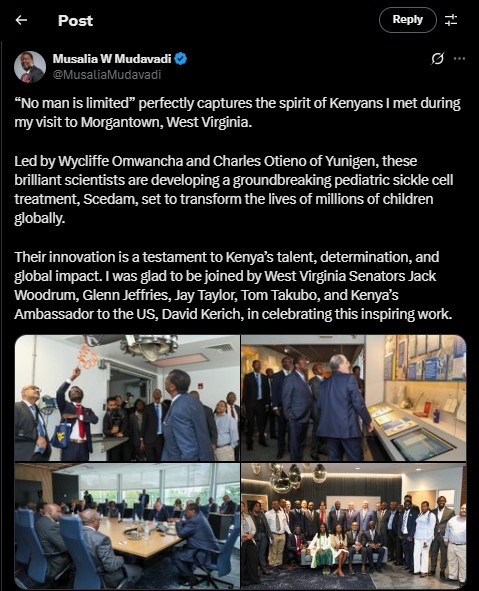Kenyan scientists in US impress Mudavadi with groundbreaking sickle cell treatment

Prime Cabinet Secretary Musalia Mudavadi on Saturday, May 10, 2025, toured a pharmaceutical firm, Yunigen, in West Virginia.
During the tour, Mudavadi met with Wycliffe Omwancha and Charles Otieno, founders of the groundbreaking pharmaceutical company in the US.
In a statement, Mudavadi indicated that he was impressed by their investment in the health sector and revealed that Omwancha and Otieno were at an advanced stage of developing pediatric sickle cell treatment called Scedam.
Scedam is the brand name for a pediatric formulation of hydroxyurea, a medication used to treat sickle cell disease in children aged nine months and older.

Mudavadi was informed that the pediatric sickle cell treatment would help millions of people battling the disease once fully rolled out.
“No man is limited perfectly captures the spirit of Kenyans I met during my visit to Morgantown, West Virginia.”
“Led by Wycliffe Omwancha and Charles Otieno of Yunigen, these brilliant scientists are developing a groundbreaking pediatric sickle cell treatment, Scedam, set to transform the lives of millions of children globally,” Mudavadi’s statement read in part.
“Their innovation is a testament to Kenya’s talent, determination, and global impact,” it added.

Their efforts
Wycliffe Omwancha is the president and chief scientific officer, and Charles Otieno is the chief executive officer and vice president of Yunigen. Their efforts include the development of Scedamin, the first pediatric formulation of hydroxyurea for treating sickle cell disease.
Hydroxyurea may also lower the risk of complications, infections, and malaria.

“Yunigen’s story is not just about its scientific achievements. It’s also about its human impact—improving and saving lives through dedication and innovation,” the two scientists say in their company website.
“As we expand our reach and deepen our research, we remain focused on the vision that sickle cell disease no longer dictates the quality of life or the length of life for those born with it,” they add.
Sickle cell
The National Heart and Lung Institute defines sickle cell disease, also called sickle cell anemia, as a group of inherited disorders that affect haemoglobin, the major protein that carries oxygen in red blood cells.
It argues that it is a lifelong illness that may be managed through preventive screening and treatment strategies. Treatment reduces or helps manage symptoms and increases longevity. With the right care, many people who have sickle cell disease live fulfilling lives and safely participate in most activities.
About 300,000 babies are born every year with sickle cell anemia, 90 per cent of whom are found in Nigeria, the Democratic Republic of Congo, and India.
In Kenya, it is estimated that 4,000 children are born with the disease, with 21 out of 100 children in Kisumu born with the sickle cell trait.













